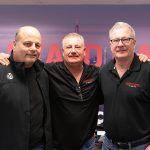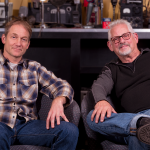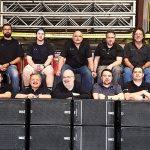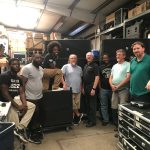Like many regional companies, Frequency City Sound & Lighting Ltd. started off from humble beginnings. Like many others, it’s a familiar tale — local rock ‘n’ roll guitar player with PA (Peavey mixer/amp head, some mics and a couple Peavey SP3 speakers) decides to branch out and make money doing sound for other bands between his group’s gigs. Eventually the business grows into a serious operation.
Now, 15 years later, it’s an LLC enterprise that owns a 44,000-square-foot warehouse and serves Ohio, Kentucky and Indiana. FCS&L has enough gear to fill several semi trucks and has the ability to handle four or five simultaneous large scale events. The company utilizes line array systems from Grund
Audio, dB Technologies and the Eidsond large-format line array.
 “I saw a need for a sound and light company that was more responsive to the clients’ needs,” says company owner Mike Volkerding, who has since expanded his services to also offer staging, event management, projection, rentals and retail sales — both brick-and-mortar as well as online at ineargear.com.
“I saw a need for a sound and light company that was more responsive to the clients’ needs,” says company owner Mike Volkerding, who has since expanded his services to also offer staging, event management, projection, rentals and retail sales — both brick-and-mortar as well as online at ineargear.com.
One of Volkerding’s newer successful ventures — ineargear.com — focuses mostly on internet in-ear sales ranging from single earpieces to complete monitoring solutions, but also consoles, mixers, accessories and most recently — full stage systems, delivered postpaid directly to the customer’s address.
“The site is all about helping club-level bands get into in-ear systems,” says Volkerding, while adding that he’s also outfitted IEM systems for touring acts such as .38 Special and The Hollies.
But for Volkerding, it is, and always has been, about keeping the customer satisfied. “Client referrals and repeat business is very important to me,” he explains. “Our motto is to treat others as you would like to be treated.” Evidently, that basic credo seems to be working, as according to Volkerding, the company has nearly doubled its business every year — mostly from word-of-mouth referrals from satisfied clients.
However, Volkerding does admit he made some mistakes along the way. The company’s original official name was Freq City. “I thought that Freq City was really cute, yet at times, I wish I wouldn’t have done it,” says Volkerding, “because I was starting to do some corporate stuff for P&G [Proctor & Gamble] and I would get a check in the mail to “Frequent City” or to “Frequency City.” Also, some people simply had a problem with that “Freq City” name. Eventually, I had to change it to Frequency City Sound & Lighting. It might be okay for doing rock shows or festivals, but for things like corporate or political events, clients don’t want to call up some guy and hire ‘Freak City.’ It’s a cute name and I really like it, but in retrospect, I probably should have picked something a little more professional sounding.”
Sticking to His Roots
Unlike some sound companies, FCS&L hasn’t turned to the install market as a means of business diversification. Other than his retail operations, Volkerding sticks to his roots as a PA/lights/event provider. A majority of the business comes from services for events, street fairs, festivals and concerts, working with a long list of acts in nearly every genre, including Blues Traveler, Quiet Riot, Huey Lewis & The News, Styx, Warrant, Roy Clark, Foreigner, Kansas, Mickey Gilley, Duke Ellington Big Band, The Osmonds, Gin Blossoms, Mel Tillis, The Marshall Tucker Band and The Guy Lombardo Orchestra.
At the same time, FCS&L has also carved a decent niche doing things as simple as offering portable speaker-on-stick PA systems for weddings. “People come in here all the time looking for a low-cost system rental and we have rigs that go for $150/$200/$250 for a weekend. Customers pick it up on Friday, we give them a quick lesson how to set it up and they bring it back on Monday. This is way better than renting gear to a club, where it’s abused and then comes back dirty or trashed. It’s a good sideline,” Volkerding adds.
 Big, but Not Too Big
Big, but Not Too Big
Business expansion is all well and good — in fact, the company is currently looking into adding another 10-box and a larger 24-box line array system to its inventory this year — but Volkerding warned about the temptation of trying to stretch too far. For example, he does shows in Ohio, Indiana and Kentucky, but doesn’t like to venture out too much farther. This mainly comes from the reality of having systems too far from home and losing access to the gear during the time it takes to transport the gear back home.
Volkerding’s also pragmatic about trying not to do too much, even close to home. “There are about three other sound companies around Cincinnati, and I’m at the point now where I probably throw each one of them a job a week. I’m booked as much as I can possibly do and do it right,” Volkerding explains. “But what I won’t do is take every single job and just get a sub-contractor to cover it. Some companies will just hire two [outside] sound guys and send them out. The clients don’t even know they’re getting these subcontracted guys who don’t necessarily care about my company. I won’t do business that way. You’ve got to take care of every client and give them 110 percent if I’m going to take the show. And this is not my only stream of income, so I don’t have to do it. I want to do it right.”
It’s a competitive market, and there are also some companies that will take a gig just to say they did a show with some certain client. “I just don’t do that anymore,” says Volkerding. “In the beginning, I had to do some of that, and I’d end up taking them. But now, we’re doing okay — well enough to not take any shows just to say that we are doing them. For example, I just had a bid from [major country artist name deleted]. I have the stuff to do it, but to do the show, I was going to end up renting the backline and supply racks and stacks — they already had all their own consoles and all that stuff. So I would have to rent a bunch of additional lighting and then rent the backline, so therefore a great deal of the bid would be going to other companies. At the end of the day, I’d end up making about as much as I would do on a city street fair — and have a whole lot more worrying to do. Their rider is more technical and their people expect a lot more. With a street fair, the bands are real happy when you’re taking care of them, and the money’s about the same!”
Keeping it Simple
Volkerding’s operation is definitely lean, with himself and a crew of four regular freelance employees, with more added during busy crunch times. But he seems pretty humble about it all and lists his title on the company website as “President/Truck Loader.” As a business owner, I wondered if he felt like that occasionally. After a chuckle, he admitted that “it’s the truth. I load all the trucks! I load the trucks, then the guys come in, pick them up, and then go do the shows. If I’m sending a truck to Bowling Green, Kentucky — which is five hours away — everything needed for the show had better be on that truck. That’s a long way to come back in case you need another amp rack or a couple more mic stands. Yet, I find the only way that this happens is if I do it myself.
“I’ve got a system down,” he continues, “and all during the week, that’s basically what I do. I get my retail stuff done and shipped for the day. Then I load trucks. Get them ready to roll for the weekend. That keeps me young, too! I’m 58. I’ve got to keep active, so I don’t get too old,” he adds with a laugh.
Asked whether he also gets out and mixes, Volkerding replied: “Only if I have to. Mostly because half of the acts out there are terrible and there is nothing — just nothing — you can do to make them sound good, and that just kills me.”
Into the Crystal Ball
So, how does the future look for FCS&L and what’s the outlook on the market right now? “Well, like I said, we have so much business, we are giving it away,” says Volkerding. “I have ordered another big hydraulic stage coming from Florida this year, so that will be our fourth stage. We’re adding a 24-box line array this year and another 10-box line array from DB Technologies.”
However, Volkerding did mention that there are challenges, even in success. “We’re expanding like crazy, but the problem with that is people. Finding guys who want to do this and really love to be in the business is tough, because, you’re certainly not doing it for the money,” he explains, “and the guys who are doing it for the money aren’t so good. You’ve got to find guys like me, where sound and music is your passion. That’s the thing.”
Ultimately, it all comes down to that age-old reality that good help is hard to find. “Kids go through these schools to be a studio guy and they want to mix bands, but really, there is a lot more to this. Basically, you’re loading and unloading trucks, and to me, an employee is more important if they can tap into the electric, they can run monitors, front of house, manage the whole show and not just be a ‘front of house engineer.’ If I could find more guys, I could do more shows, because I have the gear and I have the ability to gather more gear if I need it.”
Volkerding adds that all of this brings him even more appreciation of the key members of the Frequency City Sound & Lighting crew. “These guys include Dave Lattire — my right hand man in running this company since the beginning, sound engineer Andy Ciarniello, monitor engineer Geoff Jung and lighting guys Andy Kirk and Kyle Tieman. Without these guys, there would be no Freq City Sound.”
“I’ve always been a sales guy and a sales manager, so I think it’s in my nature to want to grow, and if I see an opportunity, I go after it. And in that warehouse during the week, I love putting together and building systems. So, until I am beat up and can’t do it anymore, I don’t see any option except to grow.”



